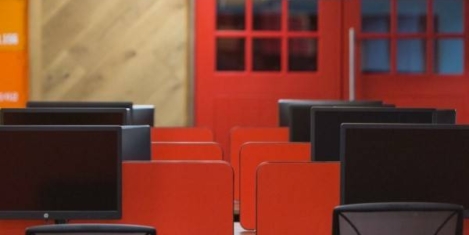May 4, 2017
Millennials’ career choices give them the best chance of adapting to automation 0
 As alarm grows in some circles over the impact of technology on future job prospects, a new survey suggests that Millennial’s jobs are likely to be at lower risk of automation. Research into how different generations choose jobs by jobs site Indeed compared the online search patterns of millions of UK jobseekers over the six months to March and found that younger people are substantially more likely to choose roles deemed to be at lower risk of automation. Nearly half of younger jobseekers were drawn to automation-resistant jobs, compared to fewer than four in 10 over-50s. These baby boomers are two thirds more likely than millennials to seek the manual jobs at highest risk of automation. While nearly half of millennials (48 percent) were searching for what economists term ‘non-routine’ roles, 61.1 percent of baby boomers were looking for ‘routine’ jobs. Routine jobs – which include sales, admin, transport and construction roles – are seen as being at higher risk of automation than non-routine work, which includes management, professional and service roles.
As alarm grows in some circles over the impact of technology on future job prospects, a new survey suggests that Millennial’s jobs are likely to be at lower risk of automation. Research into how different generations choose jobs by jobs site Indeed compared the online search patterns of millions of UK jobseekers over the six months to March and found that younger people are substantially more likely to choose roles deemed to be at lower risk of automation. Nearly half of younger jobseekers were drawn to automation-resistant jobs, compared to fewer than four in 10 over-50s. These baby boomers are two thirds more likely than millennials to seek the manual jobs at highest risk of automation. While nearly half of millennials (48 percent) were searching for what economists term ‘non-routine’ roles, 61.1 percent of baby boomers were looking for ‘routine’ jobs. Routine jobs – which include sales, admin, transport and construction roles – are seen as being at higher risk of automation than non-routine work, which includes management, professional and service roles.



















 Employees coming into work when sick are contributing to a rising trend of ‘presenteeism’ across the UK, with more than half (52 percent) of UK workers admitting to going to work when their performance is negatively affected by work-related health issues, a new survey claims. A third (34 percent) of workers have even considered moving jobs due to the negative impact of their work environment on their health – the highest percentage across Europe. The report from Fellowes, published to coincide with World Day for Safety and Health at Work, argues when a worker is present but not able to perform their function properly, it compromises their productivity. With most employees continuing to work at sub-par levels rather than taking days off to recover, this also prolongs the effect of illness. Subsequently, businesses are experiencing a detrimental knock-on impact on the quality and volume of work produced, with a further impact on overall business performance.
Employees coming into work when sick are contributing to a rising trend of ‘presenteeism’ across the UK, with more than half (52 percent) of UK workers admitting to going to work when their performance is negatively affected by work-related health issues, a new survey claims. A third (34 percent) of workers have even considered moving jobs due to the negative impact of their work environment on their health – the highest percentage across Europe. The report from Fellowes, published to coincide with World Day for Safety and Health at Work, argues when a worker is present but not able to perform their function properly, it compromises their productivity. With most employees continuing to work at sub-par levels rather than taking days off to recover, this also prolongs the effect of illness. Subsequently, businesses are experiencing a detrimental knock-on impact on the quality and volume of work produced, with a further impact on overall business performance.
 New guidance to help facilities managers manage the transition to agile working within their organisation has just been published by the British Institute of Facilities Management (BIFM). The Agile Working Change Management Guidance Note is aimed at FMs working at a senior and/or operational level and covers the benefits of agile working and how to successfully plan and implement an integrated approach to deliver sustainable change in working behaviour. Agile working describes a range of work settings that allow people and organisations to make new choices about when, where and how they work. It is underpinned by mobile technology and applies to people working both in and away from the traditional office, such as at home, on the road or remotely in other locations. BIFM’s research and information manager Peter Brogan said: “As an Institute, we recognise the importance of the workplace agenda for FMs and this newly commissioned Guidance Note aims to address the current lack of knowledge around some of the emerging workplace practices.”
New guidance to help facilities managers manage the transition to agile working within their organisation has just been published by the British Institute of Facilities Management (BIFM). The Agile Working Change Management Guidance Note is aimed at FMs working at a senior and/or operational level and covers the benefits of agile working and how to successfully plan and implement an integrated approach to deliver sustainable change in working behaviour. Agile working describes a range of work settings that allow people and organisations to make new choices about when, where and how they work. It is underpinned by mobile technology and applies to people working both in and away from the traditional office, such as at home, on the road or remotely in other locations. BIFM’s research and information manager Peter Brogan said: “As an Institute, we recognise the importance of the workplace agenda for FMs and this newly commissioned Guidance Note aims to address the current lack of knowledge around some of the emerging workplace practices.”













May 3, 2017
Wiring your brain to the Internet? What could possibly go wrong? 0
by Christopher Markou • Comment, Technology, Wellbeing
(more…)